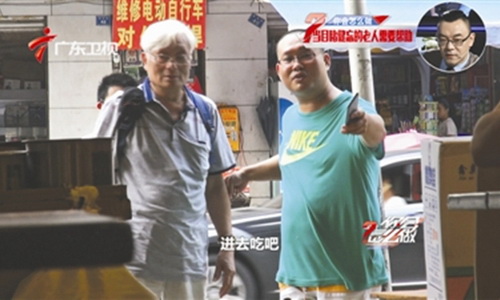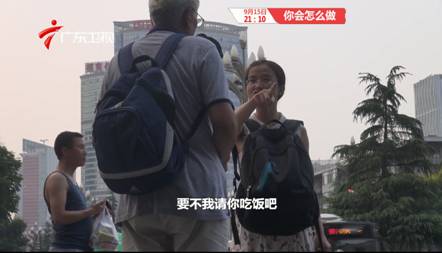


A warmhearted video recently went viral. It was shared by users and ranked top on websites, receiving more than 75 million hits on Weibo. Countless users were moved and excited by the kindness of ordinary people.
Guangdong Television’s reality show program “What would you do” is a test of good, and that test came to the city of Chengdu in southwest China’s Sichuan province recently. An actor played a lost elderly man and people’s reactions were captured. Watching the true nature of ordinary people faced with a realistic situation gave many a feeling of warmness.
In the video, a fast-food shop and a roadside stall smile generously after the elderly man left without paying. Strangers help the elderly man carry his food basket. The owner of a hotel holds the elderly man tightly as he enters, and carries his steaming hot food. Two girls from an open-air food stall help the elderly man sit down and then help him order bread. A mother who picks up her child from school lets her child hold the elderly man’s hand. A few young people change their plans to help the elderly man home. On whether the future world will be okay, these ordinary people answer this question in the affirmative.
In the interviews following the acts, these good people from Sichuan did not provide grand reasons for their actions. Instead, they talked about their everyday experiences or ordinary insights on aging. Perhaps this tells us that good deeds do not need a reason. Good deeds are maybe just ordinary people following their hearts, and there is nothing more to say.

These kind people allow us to see that good has been here all long, it never left. In everyday life we often lose hope because of so-called bad news. The breakdown of a famous marriage creates a carnival of public opinion and morality and even the law is undermined by the absurd drama. Mentors snub wisdom and act out of self-interest, and quarrels have become public events. Some people overtake other vehicles to square off, turn a blind eye to an injured child, or run illegal businesses and engage in deceptive trading. Judgments including “morality is on the decline” and “humanity’s hearth as changed” do not describe the warm scenes recorded in the streets of Chengdu. In contrast, they show humanity’s good side.
This is a program of reflection. Do we believe that morality has depreciated and that good deeds have gone bankrupt, thus giving us reason to turn our backs? Have we lost faith in human nature because of indifference and sullenness, thus becoming resentful and overly defensive? Have we become silent observers rather than active participants in society because of constant hesitation and delay? Perhaps we really do need to have a little more confidence in ourselves, in others, and in our society. We really should learn from the enthusiastic people on the streets of Chengdu, and not forget about what is good because of what is ugly.
Kindness and good deeds by ordinary people is society’s most precious resource. We can ask what happened to our society, but we cannot help but see that society still has a lot of good in it and a lot of beauty that cannot be ignored or forgotten. Because of this, there is a growing upward force that is quietly growing.
(This article is originally published on People's Daily, translated by Curtis Stone and edited by Chengliang Wu)
 Fire brigade in Shanghai holds group wedding
Fire brigade in Shanghai holds group wedding Tourists enjoy ice sculptures in Datan Town, north China
Tourists enjoy ice sculptures in Datan Town, north China Sunset scenery of Dayan Pagoda in Xi'an
Sunset scenery of Dayan Pagoda in Xi'an Tourists have fun at scenic spot in Nanlong Town, NW China
Tourists have fun at scenic spot in Nanlong Town, NW China Harbin attracts tourists by making best use of ice in winter
Harbin attracts tourists by making best use of ice in winter In pics: FIS Alpine Ski Women's World Cup Slalom
In pics: FIS Alpine Ski Women's World Cup Slalom Black-necked cranes rest at reservoir in Lhunzhub County, Lhasa
Black-necked cranes rest at reservoir in Lhunzhub County, Lhasa China's FAST telescope will be available to foreign scientists in April
China's FAST telescope will be available to foreign scientists in April "She power" plays indispensable role in poverty alleviation
"She power" plays indispensable role in poverty alleviation Top 10 world news events of People's Daily in 2020
Top 10 world news events of People's Daily in 2020 Top 10 China news events of People's Daily in 2020
Top 10 China news events of People's Daily in 2020 Top 10 media buzzwords of 2020
Top 10 media buzzwords of 2020 Year-ender:10 major tourism stories of 2020
Year-ender:10 major tourism stories of 2020 No interference in Venezuelan issues
No interference in Venezuelan issues
 Biz prepares for trade spat
Biz prepares for trade spat
 Broadcasting Continent
Broadcasting Continent Australia wins Chinese CEOs as US loses
Australia wins Chinese CEOs as US loses